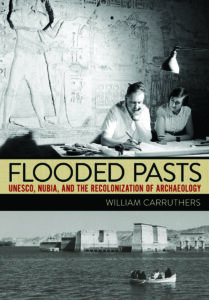Wednesday, 13 March 2024
14.00-15.00 GMT – Zoom Webinar (Register on Eventbrite here)
Creating Nubia: How Colonialism, Tourism, and Archaeology Made a Region, a Past, and a People
In the late nineteenth and early twentieth centuries, the building and heightening of the Aswan Dam under the oversight of British engineers (and, later, Egyptian capital) radically altered the relationship of the region of Nubia to Egypt. Flooding Nubian settlements and causing the population to move their homes higher up the banks of the Nile, the dam’s increasingly high floodwaters constituted Nubia within imaginaries of (ancient) Egypt itself. I will illustrate how the imbrication of imperial engineering, national development, and archaeological survey created a region in which contemporary population became disaggregated from ancient past and touristic gaze shaped all in its image. As a result, during the 1960s—and this time under the auspices of UNESCO—archaeological and preservationist intervention again took place as construction of the Aswan High Dam began and Nubia flooded further: not only in newly independent Egypt, but also on the other side of the border in the one-time Anglo-Egyptian Sudan. That work not only rested on earlier colonial intervention, but also made possible the elision of Nubians from the cross-border region, perhaps forever.

William Carruthers
William Carruthers is a historian of archaeology, heritage, and decolonisation. He is Lecturer in Heritage in the School of Philosophical, Historical, and Interdisciplinary Studies at the University of Essex. His book Flooded Pasts: UNESCO, Nubia, and the Recolonization of Heritage was published by Cornell University Press in 2022. He is also the editor of ‘Histories of Egyptology: Interdisciplinary Measures’ (Routledge, 2014), ‘Disassembling Archaeology: Reassembling the Modern World’, a special issue of the journal History of Science (with Stéphane Van Damme, 2017), and a special issue of the journal Future Anterior on ‘Heritage, Preservation, and Decolonization’ (2019). Among others, he has held fellowships from the Leverhulme Trust and the Gerda Henkel Stiftung.

